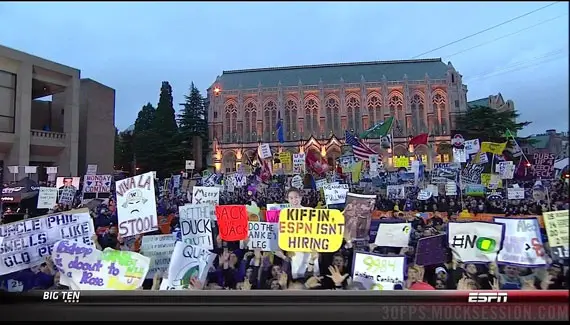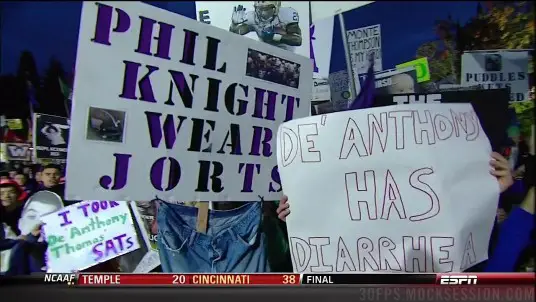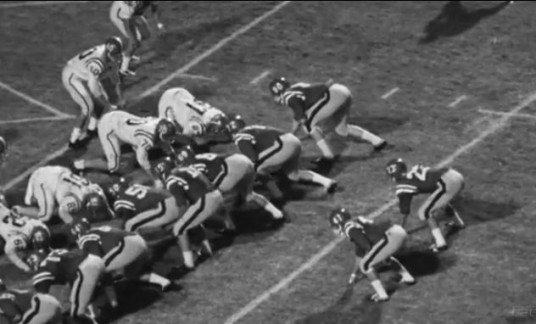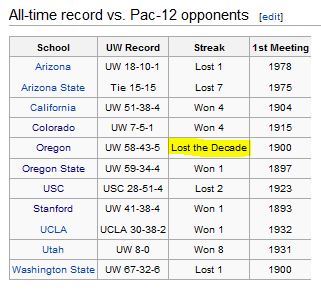30fps.mocksession.com
It was the logical choice for ESPN’s College GameDay: Washington, who was ranked 16th in the nation, and also a team coming off a three-point road loss to a top-five school, is now having their biggest rival — the nation’s second-ranked program — come to town in the highest-ranked matchup in college football last Saturday. Yet, the fact that College GameDay was making its first-ever trip to Seattle tells us all we need to know about where the Huskies, and their program, have been over the last two decades.
Since College GameDay started traveling to locations in 1993 (not long after the retirement of Don James), nine Pac-12 schools had already hosted College GameDay before the Huskies had their first chance. (Washington State and Cal are now the only Pac-12 schools that have not.)
Of course, sometimes hosting GameDay comes down to luck, whether or not a particular school is the home team for that week’s marquee matchup (Note to UCLA: Please beat Stanford this week so we can get it in Eugene again), which is why it is relevant that this is the first time since 2003 that College GameDay has ever been to the site of a Husky game. That streak of mediocrity does much for explaining Oregon winning every single game over Washington since that season.
So how did they handle the presence of the highest-profile college football show in the country? Some observations:
The Signs: Lots of unfunny signs with references to things like diarrhea, jorts, and even the Internet Explorer program. There was one theme addressed in multiple signs (other than the fact that Washington fans are kind of upset that Oregon wasn’t hit harder in sanctions), and that was the mention of Washington’s two national championships, while pointing out that Oregon has none.
We will forget for a second that the majority of the Washington’s student body was not alive the last time the Huskies won those “claimed championships,” and will instead choose to focus on the veracity of these statements, particularly how they apply to being an applicable “brag” over Oregon.
According to Wikipedia’s entry on Washington football, “Washington claims [the] 1960 and 1991 national championships, with the NCAA additionally recognizing the 1984 and 1990 seasons.” Here’s what happened in each of those seasons:
1960: Washington went 10-1, while the Ole Miss Rebels finished undefeated that season, finishing 10-0-1, and yet neither was widely recognized as the best team in the country that season. That honor belonged to 8-2 Minnesota, who was crowned champion by both the AP and UPI (the precursor to the coaches) polls.
While it is possible that Minnesota may have been declared national champions by some conference bias affecting historical results, Washington was declared the national champion by only a single poll, one put together by the Helms Foundation, an organization which had historically been funded by the well-reputed savings-and-loan industry.
Meanwhile, Football Outsiders went back and crunched the numbers to find that not only was Ole Miss the best team in college football that year, but was their 34th-greatest team of the last 100 years. Additionally, two other schools (Iowa, and the nation’s only unblemished team, 11-0 Missouri) also could make claim to a national title that season, and have just as many, if not more, polls validating their claim.
1984: The Huskies finished 11-1 that year, while BYU was undefeated and chosen as the national champions by all major polls.
1990: In one of the more wide-open years in memory, history tends to remember Colorado (11-1-1) and Georgia Tech (11-0-1) as having split the national title, with the Buffaloes taking the AP crown, while undefeated Georgia Tech was named the top team by the UPI. Washington actually lost two games that season, and was recognized by no major poll as national champions.
1991: The most dominant team in school history finishes undefeated (12-0), but so does another juggernaut from that era, the Miami Hurricanes (12-0). Washington wins a significant number of the major polls, but the AP poll picks Miami as the top team in the country. No one had any idea who the best team in the country was – because this was the “Poll Era”– and for some reason, we spent decades deciding champions by arbitrary means before the power structure decided it was a good idea for the top two teams in the country to actually meet at the end of the season, in 1998.
Starting with the 1998 season, national championships stopped being determined by a litany of often ill-advised polls, and instead were, for the most part, settled on the field. Oregon may not have won a national championship, but by being a dominant program in the BCS era, they lost the benefit of the doubt of splitting any titles that Washington benefited so heavily from during its most successful era. The Ducks finished the season ranked second in 2001 and 2012, as well as played for the national championship in 2010. Had they played in the era the Huskies did, there likely would have been a few polls that would have gone Oregon’s way.
Point is, by bragging about their titles, all of which were split, Husky fans did nothing but boast about how long ago their successes were. A more applicable sign would have read ‘Total GameDay Appearances: Oregon 17, Washington 4;” a far more accurate measurement of the two programs’ relevancy in the 21st century.
The Celebrity Guest Pickers: The Celebrity Guest Pickers: Warren Moon and Hope Solo. Oh man, thank you GameDay staff for the addition of Hope Solo. Not only is she a Husky herself, but her appearance was a reminder that she’s married to one of the vilest Huskies ever, Jerramy Stevens.
Stevens, in case you aren’t familiar, was a player whose actions – including the assault of a drugged female — while at Washington, and the program’s attempts to cover them up, were so despicable they got a 400-page book written about them. His misbehavior was so prolific into his adulthood that the words used to address his legal troubles, on his Wikipedia page, is nearly as extensive as those covering his football accomplishments. Feel free to read over that list and be reminded why any program that ever tolerated that behavior from one of its athletes, shouldn’t be questioned.
But if Solo’s association with Stevens and Washington weren’t enough to fire up the Husky hate in the Oregon faithful, her pick on College GameDay, dripping with hubris, was more than enough to do so:
“Time to bow down to Washington?” Not this year, I Hope.
Saturday, 1:00 PM, FOX Sports 1
It is so hard to pick a favorite part of the game: Was it Oregon’s 631 yards of total offense? Or possibly the continued streak of 17+ point victories? Could it be the continued emergence of Bralon Addison, or perhaps Marcus Mariota’s performance on a national stage? Or maybe it was the fact that Oregon led all 60 minutes, meaning the Ducks have more wins than minutes trailed over the last decade against Washington.
Yet there is the realization that this streak of dominance is unprecedented — by either side – over what The Mighty Ducks have done to Washington over these last ten years. Or as Washington’s Wikipedia page read yesterday: They lost the decade.
Verdict on hosting duties for Washington: Got a long way to go.
Related Articles:
Chip Kelly Update: Everything's Good Again ...
Chip Kelly Update: Wailing and Gnashing of Teeth
Shock and Awe -- The Oregon Ducks' Football Hangover Effect
Despite Lopsided Score, Georgia State "Never Stopped Believing"
Hope Springs Eternal for Ducks
Incompetent Pac-12 Officials: How Do You Miss ALL of THIS?
Nathan Roholt is a senior writer and managing editor emeritus for FishDuck. Follow him on Twitter @nathanroholt. Send questions/feedback/hatemail to nroholtfd@gmail.com.




